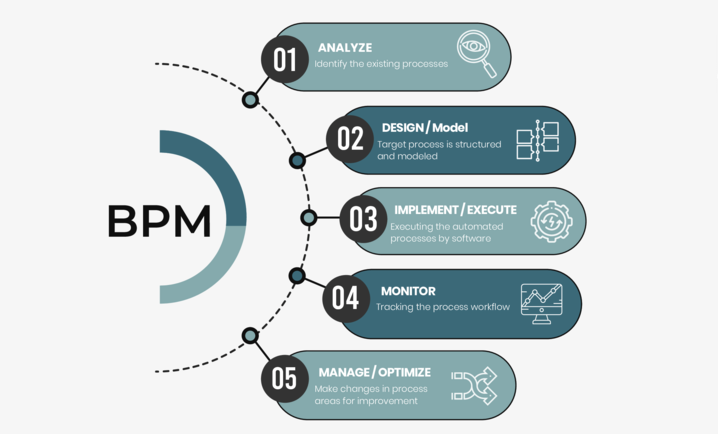Automation has become an integral part of modern business operations, enabling organizations to streamline workflows, reduce inefficiencies, and improve overall productivity. Epicor BPMS (Business Process Management Suite) is a robust tool that empowers businesses to automate their processes effectively. However, not all processes are suited for automation. Identifying the right ones is critical for maximizing efficiency and achieving desired outcomes.
In this blog, we’ll explore how to identify processes ideal for automation using Epicor BPMS, providing actionable insights that can help businesses transform their operations.
Understanding the Basics of Process Automation
Before diving into identifying the right processes, it’s essential to understand what process automation entails. Automation involves using technology to perform repetitive and time-consuming tasks with minimal human intervention. Epicor BPMS excels at managing workflows, integrating systems, and providing visibility into business processes to help companies achieve efficiency and accuracy.
Why Identifying the Right Processes Matters
Automating unsuitable processes can lead to wasted resources, inefficiencies, and even system breakdowns. On the other hand, automating the right processes can:
- Save time and resources.
- Reduce errors and inconsistencies.
- Enhance employee productivity by allowing them to focus on strategic tasks.
- Improve customer experience through faster and more accurate service delivery.
Thus, identifying processes that are ideal for automation is the first and most critical step in leveraging the full potential of Epicor BPMS.
Step-by-Step Guide to Identifying Processes for Automation
1. Map Out Existing Workflows
The first step is to have a clear understanding of your current workflows. Use process mapping techniques to visualize each step in your operations, from start to finish. This can help you:
- Identify redundancies.
- Highlight bottlenecks.
- Understand task dependencies.
Epicor BPMS includes tools for mapping workflows, allowing businesses to create detailed visual representations of their processes.
2. Look for High-Volume, Repetitive Tasks
Processes that involve repetitive tasks are prime candidates for automation. Examples include:
- Data entry and validation.
- Generating invoices or purchase orders.
- Payroll processing.
Such tasks require minimal decision-making and can benefit greatly from automation, freeing up employees for higher-value activities.
3. Identify Time-Consuming Processes
Any process that consistently consumes a significant amount of time without proportional value can be considered for automation. For example:
- Manual report generation.
- Approval workflows with multiple stages.
- Customer onboarding processes.
Epicor BPMS can streamline these workflows by automating document generation, routing tasks to the right stakeholders, and sending reminders for pending actions.
4. Pinpoint Error-Prone Tasks
Processes prone to human error are ideal for automation. For instance:
- Data entry errors in financial transactions.
- Miscommunications in order processing.
- Manual inventory tracking inaccuracies.
By automating these processes, Epicor BPMS ensures consistency and accuracy, reducing costly mistakes.
5. Evaluate Customer-Facing Processes
Customer-facing processes, such as order tracking, complaint resolution, or service requests, can benefit immensely from automation. Automating these tasks ensures faster response times and enhances the customer experience.
6. Assess Processes That Require Consistent Compliance
Industries with stringent regulatory requirements can use automation to maintain compliance. Processes such as:
- Audit trail generation.
- Regulatory reporting.
- Document management.
Epicor BPMS ensures that these tasks are performed consistently and in line with regulatory standards.
7. Focus on Scalability
Processes that are expected to scale with business growth should also be considered for automation. For example:
- Employee onboarding during rapid expansion.
- Managing increasing order volumes.
- Scaling marketing campaigns.
Automation with Epicor BPMS enables these processes to grow without requiring proportional increases in manual effort.
8. Consult with Stakeholders
Engage department heads and employees who are directly involved in the processes to gain deeper insights. They can highlight pain points and provide recommendations for areas that could benefit most from automation.
Common Pitfalls to Avoid When Identifying Processes
While identifying processes for automation, it’s important to avoid these common mistakes:
- Over-Automating: Not every task needs to be automated. Focus on processes that deliver measurable ROI.
- Ignoring Exceptions: Some processes may involve edge cases that cannot be automated. Identify these exceptions and plan accordingly.
- Neglecting Employee Input: Employees are often the best source of insight into inefficient processes.
- Skipping Process Optimization: Automating an inefficient process will only perpetuate the inefficiency. Optimize the process before automation.
Benefits of Automating with Epicor BPMS
Once you’ve identified the right processes, automating them with Epicor BPMS offers numerous benefits:
- Improved Efficiency: Automates repetitive tasks, reducing processing times.
- Better Accuracy: Eliminates human errors in critical processes.
- Enhanced Collaboration: Provides visibility and communication tools for teams to work more effectively.
- Scalability: Handles increasing workloads without the need for additional resources.
Conclusion
Identifying the right processes for automation is key to leveraging the full potential of Epicor BPMS. By focusing on repetitive, time-consuming, error-prone, and customer-facing tasks, businesses can streamline operations, reduce costs, and enhance productivity. Moreover, consulting stakeholders and continuously optimizing workflows ensure that automation efforts deliver maximum value.
With Epicor BPMS, businesses can unlock their potential for growth and efficiency. At Epicforce Tech, we believe in empowering organizations to make smarter decisions and implement effective solutions. Whether you’re starting your automation journey or looking to enhance existing workflows, our expertise ensures your success.
Read More:


